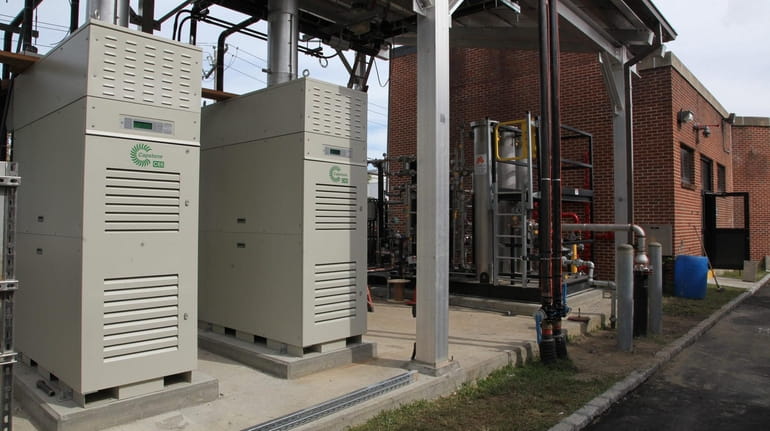'Grease' is the word for Great Neck conservation efforts

Grease-eating microorganisms power the turbines at the Great Neck Water Pollution Control District, seen in 2014. Credit: Howard Schnapp
The grease-eating microorganisms that power the turbines at the Great Neck Water Pollution Control District have snagged the district an Environmental Excellence Award from the state Department of Environmental Conservation.
The award is given to projects that show “green leadership by adopting innovative solutions to protect our environment and strengthen our economy,” DEC Commissioner Basil Seggos said in a release.
“By combining two aging wastewater treatment plants, the district's state-of-the-art facility is saving taxpayers more than $2 million annually. The district is going above and beyond regulatory water regulations and implementing projects that demonstrate its commitment to reduce carbon emissions, save water, reduce the use of hazardous chemicals, and reduce nutrient loadings,” the DEC said in a release Wednesday announcing the award.
The sustainability programs at Stony Brook University Hospital and Suffolk County Community College also received awards for reducing food and plastics waste.
The Great Neck water pollution control district is building the first grease receiving station in Nassau County, where grease will be collected from local restaurants and fed to anaerobic digesters — microorganisms that break down the molecules of organic matter and convert them into methane gas.
The methane gas will then be burned in the facility's two microturbines to produce 35 percent of the plant's electricity and 80 percent of its heating. The addition of a third microturbine is expected to enable the system to produce all of the plant's heat and 50 percent of its electric needs.
The grease receiving station facility is expected to be completed by early 2020.
The proponents see the system as an elegant way to dispose of restaurant-grade grease waste by turning it into power.
"It's such a win-win situation," water pollution control district Commissioner Patty Katz said in an interview.
"It’s like one is feeding the other, and ultimately it's feeding the needs of the plant by lowering our costs to power it," said Commissioner Steve Reiter in an interview.
While the state award does not come with a monetary prize, Katz and Reiter said they hope the recognition will boost the profile of their project and catch the attention of others in their industry.
"The purpose of it is to get it out there to other treatment centers to replicate what we’re doing, because it's so doable," Katz said. "It's our aim to have others implement what we’re doing — we hope that the good practices that we’re doing will really be replicated."
Gilgo Beach search latest ... Tax breaks for manufacturer... Knicks playoffs ... Islanders vs. 'Canes, Game 3
Gilgo Beach search latest ... Tax breaks for manufacturer... Knicks playoffs ... Islanders vs. 'Canes, Game 3
